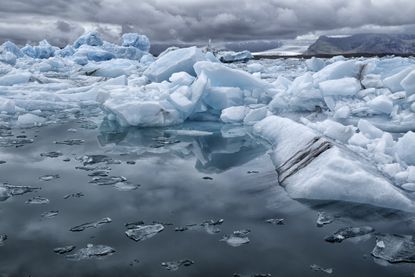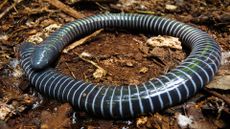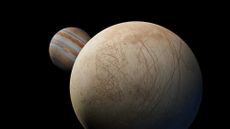The Arctic's thickest sea ice is deteriorating, alarming scientists


Climate change and warm winds have caused some of the oldest and thickest sea ice in the Arctic to break apart, The Guardian reported Tuesday, calling into question just how long the region's "last ice area" will withstand ever-rising temperatures.
In the sea off the north coast of Greenland, sea ice is frozen so thick that scientists thought it would be the last area in the North to melt away as climate change pushes temperatures higher and higher. But the region has endured unprecedented heat this summer, hitting a record high of 62.6 degrees Fahrenheit just last week. Warm winds left the ice "quite shattered and broken up and therefore more mobile," Ruth Mottram of the Danish Meteorological Institute explained, which has pushed the ice farther away from the coast than ever before.
When the sea ice blows around, it can be swept away into warmer waters where it melts for good, said Thomas Lavergne of the Norwegian Meteorological Institute. "I cannot tell how long this open water patch will remain open, but even if it closes in few days from now, the harm will be done," he said. "The thick old sea ice will have been pushed away from the coast, to an area where it will melt more easily."
Subscribe to The Week
Escape your echo chamber. Get the facts behind the news, plus analysis from multiple perspectives.

Sign up for The Week's Free Newsletters
From our morning news briefing to a weekly Good News Newsletter, get the best of The Week delivered directly to your inbox.
From our morning news briefing to a weekly Good News Newsletter, get the best of The Week delivered directly to your inbox.
Scientists said that some of the ice will freeze again, but likely later in the winter than usual. While this gap in the Arctic sea ice is not the first one to form, the alarming temperatures and significant size of this gap in the "last ice area" have experts calling the most recent break "scary." Read more at The Guardian.
Sign up for Today's Best Articles in your inbox
A free daily email with the biggest news stories of the day – and the best features from TheWeek.com
Summer Meza has worked at The Week since 2018, serving as a staff writer, a news writer and currently the deputy editor. As a proud news generalist, she edits everything from political punditry and science news to personal finance advice and film reviews. Summer has previously written for Newsweek and the Seattle Post-Intelligencer, covering national politics, transportation and the cannabis industry.
-
 The Democrats: time for wholesale reform?
The Democrats: time for wholesale reform?Talking Point In the 'wreckage' of the election, the party must decide how to rebuild
By The Week UK Published
-
 5 deliciously funny cartoons about turkeys
5 deliciously funny cartoons about turkeysCartoons Artists take on pardons, executions, and more
By The Week US Published
-
 Crossword: November 23, 2024
Crossword: November 23, 2024The Week's daily crossword puzzle
By The Week Staff Published
-
 Dark energy data suggest Einstein was right
Dark energy data suggest Einstein was rightSpeed Read Albert Einstein's 1915 theory of general relativity has been proven correct, according to data collected by the Dark Energy Spectroscopic Instrument
By Peter Weber, The Week US Published
-
 New DNA tests of Pompeii dead upend popular stories
New DNA tests of Pompeii dead upend popular storiesSpeed Read An analysis of skeletal remains reveals that some Mount Vesuvius victims have been wrongly identified
By Peter Weber, The Week US Published
-
 NASA's Europa Clipper blasts off, seeking an ocean
NASA's Europa Clipper blasts off, seeking an oceanSpeed Read The ship is headed toward Jupiter on a yearslong journey
By Peter Weber, The Week US Published
-
 Detailed map of fly's brain holds clues to human mind
Detailed map of fly's brain holds clues to human mindSpeed Read This remarkable fruit fly brain analysis will aid in future human brain research
By Peter Weber, The Week US Published
-
 Blind people will listen to next week's total eclipse
Blind people will listen to next week's total eclipseSpeed Read While they can't see the event, they can hear it with a device that translates the sky's brightness into music
By Peter Weber, The Week US Published
-
 Melting polar ice is messing with global timekeeping
Melting polar ice is messing with global timekeepingSpeed Read Ice loss caused by climate change is slowing the Earth's rotation
By Peter Weber, The Week US Published
-
 An amphibian that produces milk?
An amphibian that produces milk?speed read Caecilians, worm-like amphibians that live underground, produce a milk-like substance for their hatchlings
By Peter Weber, The Week US Published
-
 Jupiter's Europa has less oxygen than hoped
Jupiter's Europa has less oxygen than hopedspeed read Scientists say this makes it less likely that Jupiter's moon harbors life
By Peter Weber, The Week US Published